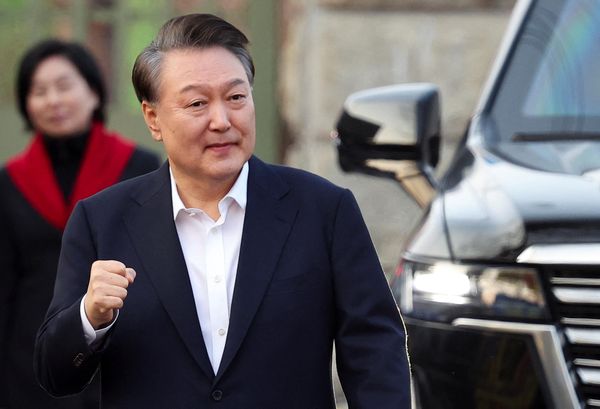SEOUL, April 12 — Former South Korean president Yoon Suk-yeol returned to his private home on Friday from the official residence after his removal from office, with crowds of supporters turning out to greet his motorcade.
The Constitutional Court upheld Yoon's impeachment last Friday, capping four months of unprecedented constitutional turmoil after his short-lived attempt to impose martial law in December sent shockwaves through Asia's fourth-largest economy.
South Korea will now hold a snap election on June 3, and questions remain over whether Yoon might still play a role, given how his impeachment appears to have deepened polarisation in society and stirred up his conservative supporters.
Hundreds had gathered outside the gates of the official residence, where Yoon briefly stopped to hug and shake hands with supporters, some of whom were crying.
The ousted president has not been seen in public since he was released from prison on March 8, when a court cancelled his detention warrant in the criminal case against him. He did not attend the impeachment ruling by the Constitutional Court on April 4.
However, a number of his ruling party members and supporters have been seen visiting the official residence, where Yoon reportedly discussed the upcoming election.
Video footage showed Yoon leaving the official residence in a red baseball cap with the slogan 'Make Korea Great Again', given to him by a supporter.
"Now I will go back to being one of the people... and find a new way for the country and the people," he said in a written message relayed via his lawyer.
Yoon and his wife were driven in a motorcade from the official presidential residence to their private apartment in a 37-storey building in Seoul. The pet-loving couple will also take back more than 10 dogs and cats they own.
Some 280 police were deployed around his private home on Friday ahead of the move, and Yoon is to be accompanied by a security detail of about 50 people, media reported.
The former president still faces trial on a criminal charge of leading an insurrection, which is punishable by death or a life sentence if he is convicted.
The race to replace Yoon kicked off this week, with nearly 20 hopefuls expected to contest for the candidacy of the conservative People Power Party that is in a fight to retain the presidency against a populist liberal who leads in the polls.
[caption id="attachment_393717" align="aligncenter" width="1233"] Far-right protesters chant slogans during a rally to support impeached South Korean President Yoon Suk Yeol in central Seoul, South Korea, on March 15, 2025. — Picture by REUTERS[/caption]
Far-right protesters chant slogans during a rally to support impeached South Korean President Yoon Suk Yeol in central Seoul, South Korea, on March 15, 2025. — Picture by REUTERS[/caption]
Trailing in polls
Polls show that candidates are set to face an uphill battle against the populist former leader of the Democratic Party Lee Jae-myung, who declared his bid on Thursday.
All the conservative candidates are receiving single-digit support in polls, with former labour minister Kim Moon-soo leading the pack at nine per cent, far behind Lee at 37 per cent, according to a Gallup Korea poll released on Friday.
Lee, who faces potential legal obstacles to his presidential bid from various legal cases, has pledged to overcome polarisation in society and spur economic growth if elected.
Unveiling his policy vision on Friday, he said he wanted to help the industrial powerhouse focus on cutting-edge science and technology.
"To survive in the ruthless global battlefield, I make an appeal to you to shift the paradigm from copying to leading," Lee told a press conference.
Yoon has said his December 3, 2024, martial law was meant to expose the Democratic Party's abuse of the Parliamentary majority to stall his policies, not to impose full military rule.
The Democratic Party and his critics say his actions amounted to an insurrection that nearly destroyed democracy.
— Reuters
[caption id="attachment_384887" align="aligncenter" width="1268"] Protesters march during a rally against South Korea’s impeached President Yoon Suk Yeol, who declared martial law, which was reversed hours later, in Seoul, South Korea, on December 28, 2024. — Picture by REUTERS[/caption]
Protesters march during a rally against South Korea’s impeached President Yoon Suk Yeol, who declared martial law, which was reversed hours later, in Seoul, South Korea, on December 28, 2024. — Picture by REUTERS[/caption]




